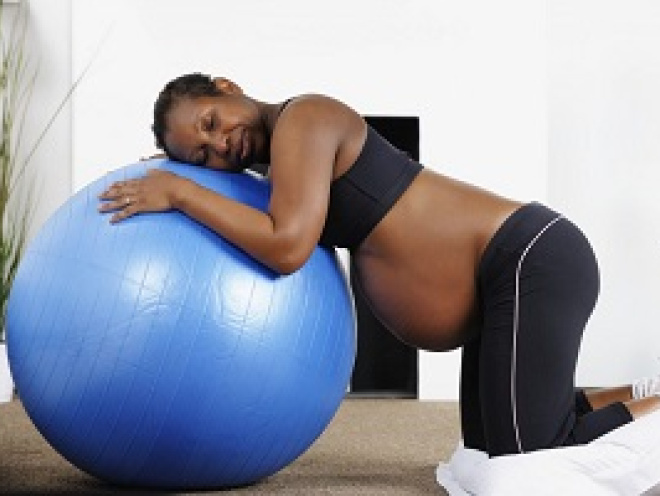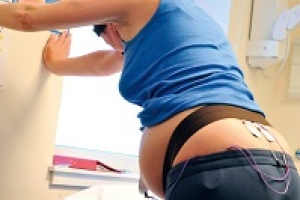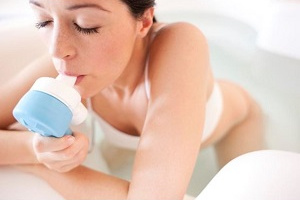For women who experience bad back pain in labour, sterile water injections can help to ease it. Here we explain about this more unusual pain reliever...
What are sterile water injections?
Sterile water injections involve tiny amounts of sterile water being injected into the skin around your lower back (sacrum) to relieve pain in labour. It might sound like something that shouldn’t work but there is some evidence it can help. It’s usually used for women experiencing strong back pain in labour (Derry et al, 2012).
Midwives can give sterile water injections so they could be ideal for use in midwife-led units or other settings with less medical support (Fouly et al, 2018; Koyucu et al, 2018).
How do sterile water injections relieve pain?
Opinions differ on how exactly sterile water injections work. The idea is that the stimulus of sterile water injections might ‘shut the gate’ and prevent back pain or labour pain signals from reaching the brain (Fouly et al, 2018).
Another theory suggests that as the injection produces irritation in the skin, this provokes changes in certain nerve fibres, which leads to endorphin release similar to that seen with acupuncture or TENS machines (Derry et al, 2012).
Another explanation is that sterile water injections may work as a physiological distraction (Derry et al, 2012).
Are sterile water injections any good for pain in labour?
Four injection points are used to inject 0.1ml to 0.5ml of water so it forms small blisters under the skin (Derry et al, 2012; Martensson et al, 2017; Fouly et al, 2018). The injections are painful so are usually given at the height of a contraction by two midwives simultaneously to reduce the feeling of pain from the injections themselves (Derry et al, 2012). The pain from the injection lasts about 30 seconds but after that, these injections might reduce the pain of contractions for two to three hours, with the greatest effect between 30 and 120 minutes (Derry et al, 2012; Koyucu et al, 2018).
Injections can be repeated as often as required with no adverse effects (apart from the administration pain) on the mother or their baby (Martensson et al, 2017).
Studies vary in their findings on the effectiveness of sterile water injections as a method of pain relief for labour and there hasn’t been enough evidence to support the widespread use of sterile water for pain relief (Derry et al, 2012). More recent studies have found that women reported a significant reduction in their back pain during labour after sterile water injections (Martenson et al, 2017; Fouly et al, 2018; Koyucu et al, 2018; Lee et al 2020). In one clinical trial, around a third of women reported that their labour pain approximately halved at 30, 60 and 90 minutes after the injection (Lee et al, 2020).
Are sterile water injections suitable for everyone?
In theory, they might not be suitable for women with a rash on their lower back (RCM, 2016).
Sterile water injections could be particularly suitable for women wishing to avoid regional anaesthesia (epidural) or who are labouring where epidurals are not available (Martenson et al, 2017; Fouly et al, 2018).
What are women’s experiences of sterile water injections?
Some studies have found that the majority of women say sterile water injections are effective. These women also said they suffered few side effects, and they appreciated the break from the pain that allowed them to focus on their labour (RCM, 2016; Lee et al, 2017; Koyucu et al, 2018; Lee et al, 2020). In one study, more than six in 10 women described the injections as effective and seven in 10 would recommend them to others in labour (Lee et al, 2020).
Some women describe the pain associated with the injections as feeling like an insect sting, which may put some off using this form of pain management in labour (Lee et al, 2017).
Are there any side effects?
Women can get a burning pain at the injection site but this wears off within a minute of the injection (Derry et al, 2012; Fouly et al, 2018; Lee et al, 2020). No other impacts on the mother or baby have been found.
Sterile water injections may offer an alternative to other forms of pain management in labour, the use of which can impact on mobility, length of labour, state of consciousness, or have a negative effect on the baby (Koyucu et al, 2018).
Do sterile water injections have any impact on labour or breastfeeding?
Research suggests that sterile water injections: do not have any impact on how a baby is born (vaginally or by caesarean), that there is no effect on the length of labour and no negative effects on the baby. No adverse effects on the mother and no impact on breastfeeding initiation were found either (Koyucu et al, 2018).
Another study found that there is no change in other pain relief used or on the likelihood of assisted birth (Lee et al, 2020).
Are there any long-term effects?
None identified.
What if I don’t like sterile water injections?
The most difficult part of sterile water injections is the immediate reaction to them. Once the injection is complete, you might decide not to repeat it.
Are sterile water injections widely used?
Sterile water injections are cheap, easy to administer and a potentially effective method of pain relief. However, they are not widely available (Derry et al, 2012; RCM, 2016).
The National Institute for Health and Care Excellence (NICE) do not currently recommend sterile water injections in their guidance for pain relief for labour based on evidence from 2007 (NICE, 2017). This might explain why they are not widely available in the UK while they are used regularly in countries such as Sweden and Australia (Lee et al, 2020).
When would I have sterile water injections?
You can have sterile water injections in latent (early) or active (established) labour (RCM, 2016).
How can my birth partner help?
Your birth partner can help you to stay in a good position, comfortable, hydrated and emotionally supported, particularly during the administration of the injections. You and your partner are encouraged not to rub the blisters so a back rub on that area might be out.
Can I use other pain relief with sterile water injections?
Possibly not TENS as it would be working on the same part of the body. Water might be used after a sterile water injection (RCM, 2016).
Sterile water injections are used primarily for low back pain in labour and may not affect the other pain of labour contractions, so some other form of pain relief may be needed in addition (Koyucu et al, 2018; Lee et al, 2020). Gas and air, opiates or epidurals may be available depending on the place of birth.
Would I need any extra procedures with sterile water injections?
No additional procedures are necessary.
This page was last reviewed in January 2022.
Further information
Our support line offers practical and emotional support with feeding your baby and general enquiries for parents, members and volunteers: 0300 330 0700.
We also offer antenatal courses which are a great way to find out more about pregnancy and life with a new baby.
Research from the Royal College of Obstetricians and Gynaecologists (RCOG) about the use of water as pain relief in labour.
Derry S, Straube S, Moore RA, Hancock H, Collins SL. (2012) Intracutaneous or subcutaneous sterile water injection compared with blinded controls for pain management in labour. Cochrane Database Syst Rev. (1):CD009107. Available at: https://doi.org/10.1002/14651858.CD009107.pub2
Fouly H, Herdan R, Habib D, Yeh C. (2018) Effectiveness of injecting lower dose subcutaneous water verses saline to relief labor back pain: randomised controlled trial. Eur J Midwifery. 2(3). Available at: https://doi.org/10.18332/ejm/85793
Lee N, Gao Y, Collins S, Martensson L, Randall W, Rowe T, Kildea S. (2020) Caesarean delivery rates and analgesia effectiveness following injections of sterile water for back pain in labour: a multicentre, randomised placebo controlled trial. EClinicalMedicine. 25:100447. Available at: https://doi.org/10.1016/j.eclinm.2020.100447
Lee N, Kildea S, Stapleton H. (2017) “No pain, no gain”: the experience of women using sterile water injections. Women Birth. 30(2):153-158. Available at: https://doi.org/10.1016/j.wombi.2016.09.010
Koyucu R, Demirci N, Yumru A, Salman S, Ayanoğlu YT, Tosun Y, Tayfur C. (2018) Effects of intradermal sterile water injections in women with low back pain in labor: a randomized, controlled, clinical trial. Balkan Med J. 35(2):148‐154. Available at: https://doi.org/10.4274/balkanmedj.2016.0879
Martensson LB, Hutton EK, Lee N, Kildea S, Gao Y, Bergh I. (2017) Sterile water injections for childbirth pain: an evidence based guide to practice. Women Birth. 31(5):380-385. Available at: https://doi.org/10.1016/j.wombi.2017.12.001
NICE. (2017) Intrapartum care for healthy women and babies. Available at: https://www.nice.org.uk/guidance/cg190/chapter/Recommendations [Accessed 26th January 2022]
RCM. (2016) Introducing sterile water injections as an alternative for pain relief. Available at: https://www.youtube.com/watch?v=FLO2Cn8zEvs [Accessed 26th January 2022]








